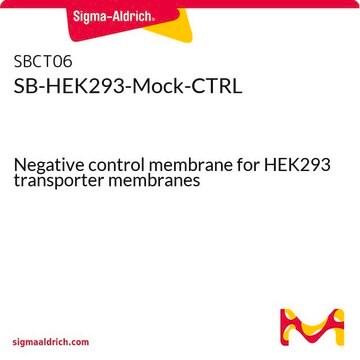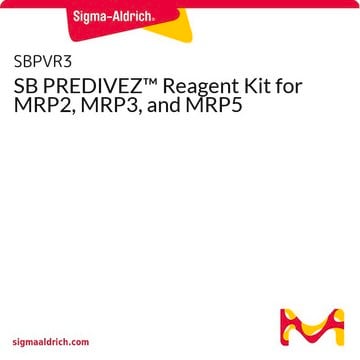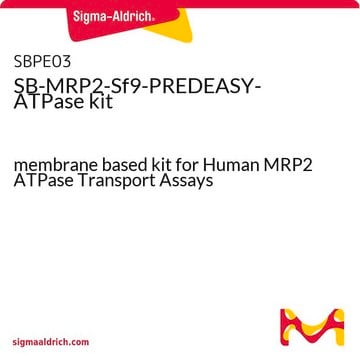SBVT08
SB-MRP5-HEK293
MRP5 human membrane vesicles
Sinónimos:
ABCC5, MRP5, Multidrug resistance associated protein 5
Iniciar sesiónpara Ver la Fijación de precios por contrato y de la organización
About This Item
UNSPSC Code:
41106514
NACRES:
NA.84
Productos recomendados
recombinant
expressed in HEK 293 cells
form
liquid
concentration
5 mg/mL
color
off-white
UniProt accession no.
shipped in
dry ice
storage temp.
−70°C
Gene Information
human ... ABCC5(10057)
General description
Membrane Preparations for Vesicular Transport Assays (VT) are suitable for general drug-efflux transporter interaction studies. Both substrate and inhibitor interactions can be assessed using vesicles. The success of substrate interaction studies strongly depends on the passive permeability of the compound. High permeability substrates might not be detected. Control Membranes with no-, or significantly lower transporter activity are also available.
Application
In the vesicular transport assay so-called "inside-out" membrane vesicles containing ABC transporters are applied. Incubating substrates of the respective efflux transporter in the presence of the inverted membrane vesicles and ATP will allow measuring accumulation of the substrates into the vesicles. In many cases radiolabeled reporter substrates are used but recently SOLVO developed the new PREDIVEZ Vesicular Transport Kits that use fluorescent reporter substrates.
The standard vesicular transport assay is an inhibitory assay performed with cold test articles. This assay provides information on any interaction between the ABC transporter and the test article. The transport of the reporter substrate is measured in the presence of the test article (typically in 7 concentrations) and IC50 is defined as the concentration inhibiting the transport of the reporter substrate by 50%.
Should radiolabeled form of the investigated compound or adequate analytical methods (LC/MS, HPLC) be available, the vesicular transport assay may be performed in a direct format without the reporter substrate and may identify substrate nature of the test article. The vesicular transport substrate assay is a low throughput assay. It is suitable for low permeability test compounds as high permeability compounds may escape from the vesicles through the lipid bilayer.
PREDIVEZ vesicular transport kit is sold separately. This transporter membrane vesicle assay requires the PREDIVEZ vesicular transport kit and corresponding control membrane below:
SB PREDIVEZ Reagent Kit for MRP2, MRP3, and MRP5 part number SBPVR3-9RXN and corresponding control membrane SB-HEK293-Mock-CTRL part number SBCT06-1EA
The standard vesicular transport assay is an inhibitory assay performed with cold test articles. This assay provides information on any interaction between the ABC transporter and the test article. The transport of the reporter substrate is measured in the presence of the test article (typically in 7 concentrations) and IC50 is defined as the concentration inhibiting the transport of the reporter substrate by 50%.
Should radiolabeled form of the investigated compound or adequate analytical methods (LC/MS, HPLC) be available, the vesicular transport assay may be performed in a direct format without the reporter substrate and may identify substrate nature of the test article. The vesicular transport substrate assay is a low throughput assay. It is suitable for low permeability test compounds as high permeability compounds may escape from the vesicles through the lipid bilayer.
PREDIVEZ vesicular transport kit is sold separately. This transporter membrane vesicle assay requires the PREDIVEZ vesicular transport kit and corresponding control membrane below:
SB PREDIVEZ Reagent Kit for MRP2, MRP3, and MRP5 part number SBPVR3-9RXN and corresponding control membrane SB-HEK293-Mock-CTRL part number SBCT06-1EA
Physical form
Supplied as frozen membrane vesicles, containing 5 mg/ml membrane protein, labeled with volume, catalog number (transporter) and date of production.
Legal Information
Distributed for SOLVO Biotechnology, Inc.
related product
Referencia del producto
Descripción
Precios
Storage Class
10 - Combustible liquids
wgk_germany
WGK 2
flash_point_f
Not applicable
flash_point_c
Not applicable
Certificados de análisis (COA)
Busque Certificados de análisis (COA) introduciendo el número de lote del producto. Los números de lote se encuentran en la etiqueta del producto después de las palabras «Lot» o «Batch»
¿Ya tiene este producto?
Encuentre la documentación para los productos que ha comprado recientemente en la Biblioteca de documentos.
Peter Wielinga et al.
Cancer research, 65(10), 4425-4430 (2005-05-19)
Members of the multidrug resistance protein family, notably MRP1-4/ABCC1-4, and the breast cancer resistance protein BCRP/ABCG2 have been recognized as cellular exporters for the folate antagonist methotrexate (MTX). Here we show that MRP5/ABCC5 is also an antifolate and folate exporter
Susan Pratt et al.
Molecular cancer therapeutics, 4(5), 855-863 (2005-05-18)
5'-Fluorouracil (5-FU), used in the treatment of colon and breast cancers, is converted intracellularly to 5'-fluoro-2'-deoxyuridine (5-FUdR) by thymidine phosphorylase and is subsequently phosphorylated by thymidine kinase to 5'-fluoro-2'-dUMP (5-FdUMP). This active metabolite, along with the reduced folate cofactor, 5,10-methylenetetrahydrofolate
The multidrug resistance protein 5 functions as an ATP-dependent export pump for cyclic nucleotides.
G Jedlitschky et al.
The Journal of biological chemistry, 275(39), 30069-30074 (2000-07-13)
Cellular export of cyclic nucleotides has been observed in various tissues and may represent an elimination pathway for these signaling molecules, in addition to degradation by phosphodiesterases. In the present study we provide evidence that this export is mediated by
Glen Reid et al.
Molecular pharmacology, 63(5), 1094-1103 (2003-04-16)
The human multidrug resistance proteins MRP4 and MRP5 are organic anion transporters that have the unusual ability to transport cyclic nucleotides and some nucleoside monophosphate analogs. Base and nucleoside analogs used in the chemotherapy of cancer and viral infections are
C E Grant et al.
Cancer research, 54(2), 357-361 (1994-01-15)
Amplification of the gene encoding multidrug resistance-associated protein (MRP) and overexpression of its cognate mRNA have been detected in multidrug-resistant cell lines derived from several different tumor types. To establish whether or not the increase in MRP is responsible for
Nuestro equipo de científicos tiene experiencia en todas las áreas de investigación: Ciencias de la vida, Ciencia de los materiales, Síntesis química, Cromatografía, Analítica y muchas otras.
Póngase en contacto con el Servicio técnico








